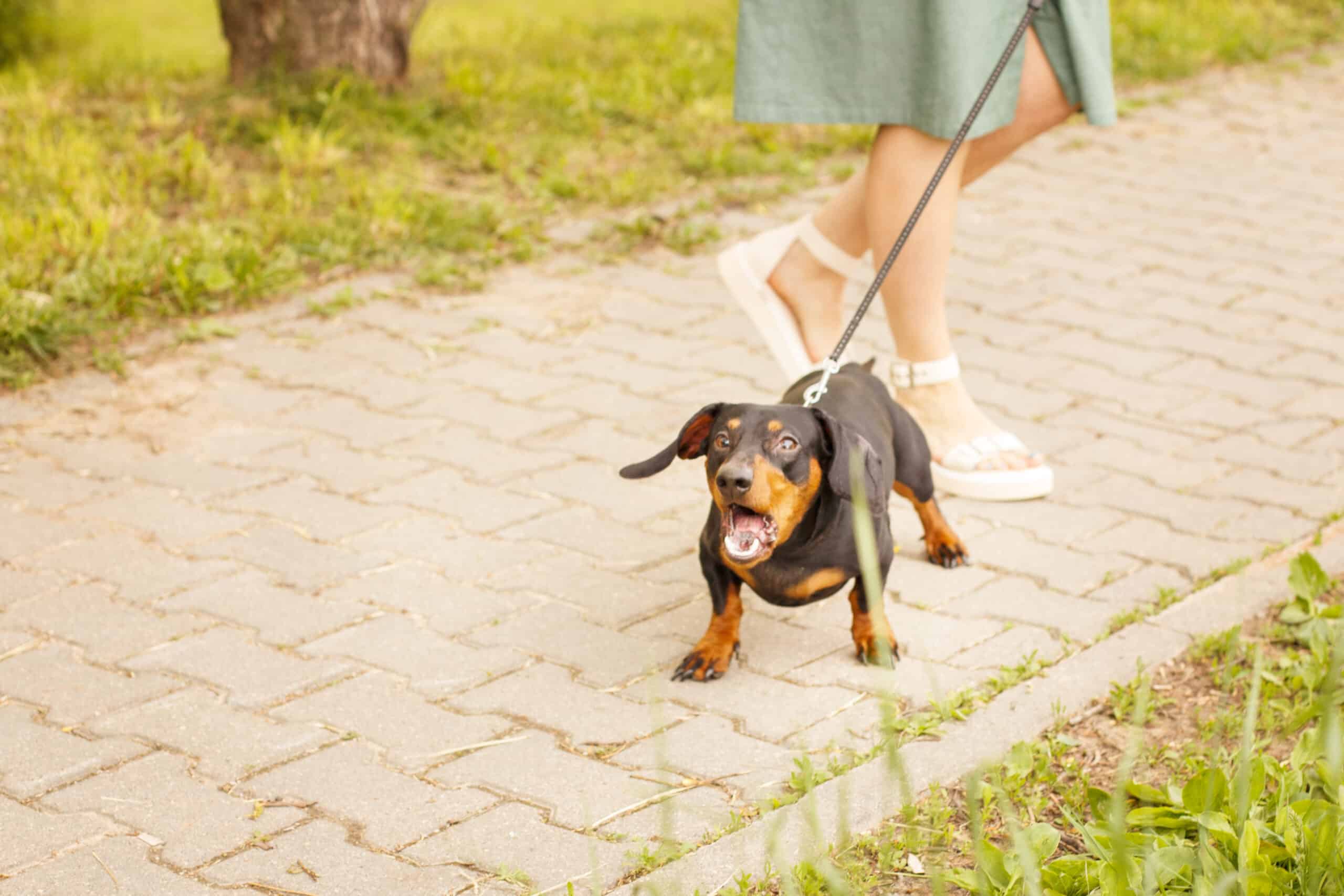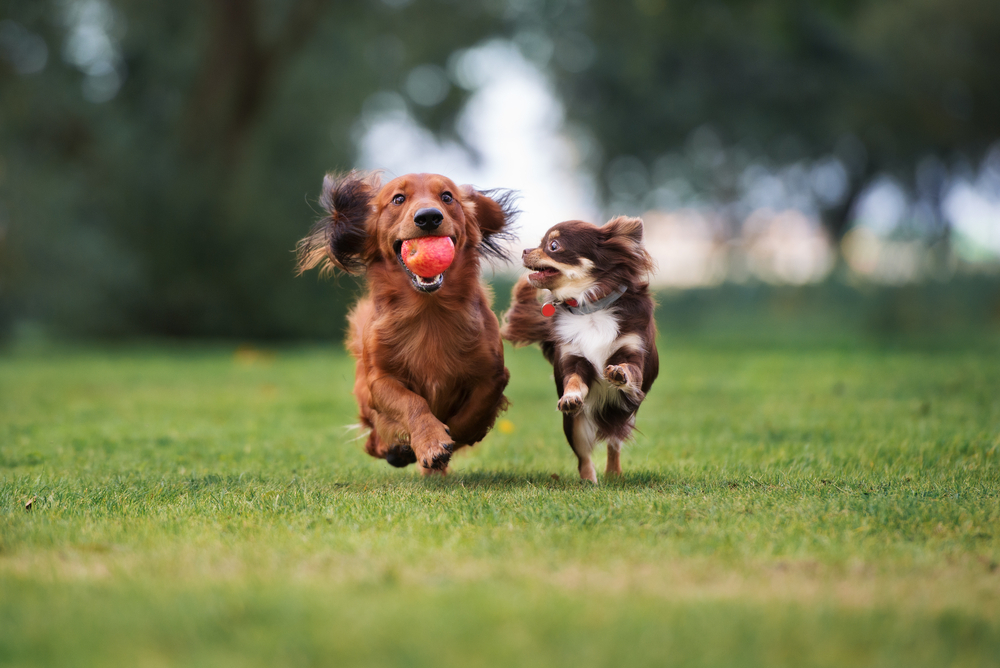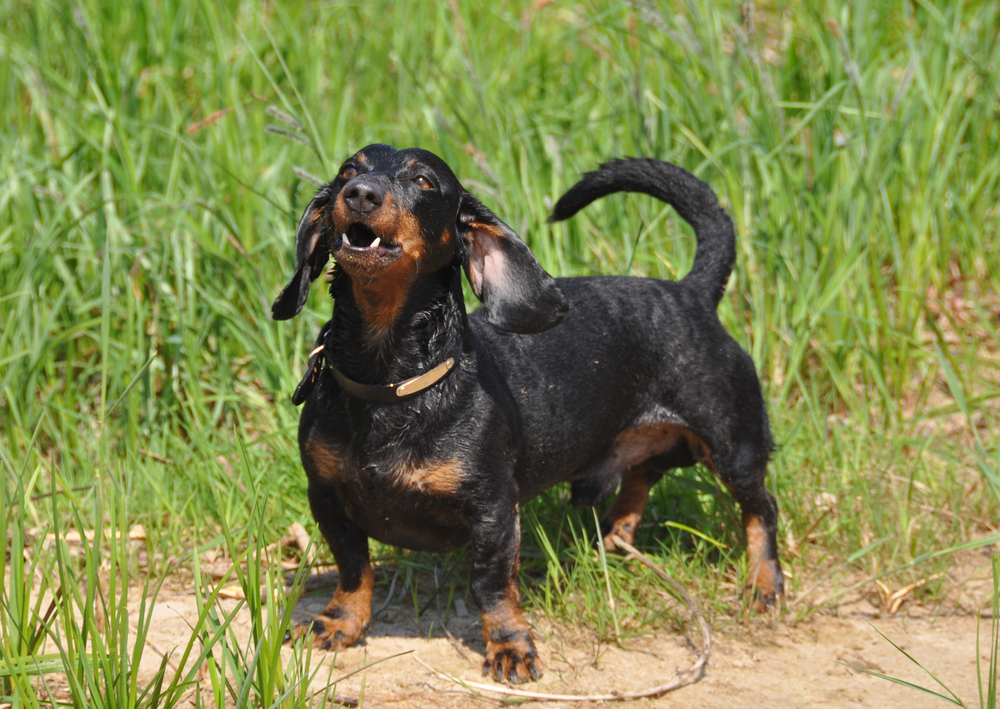In this article
View 2 More +Dachshunds are affectionate and charming, but it can be surprising how this small animal can make such a big sound when they bark. They do seem to love the sound of their own voice! If you own one of these adorable dogs, you may be desperately looking for tips on how to stop your Dachshund barking.
The Dachshund is a vocal breed, so it’s important to know that you won’t be able to keep them completely silent, but you can keep your dog’s barking under control and manageable with these great tips!

Getting Started
Dachshunds enjoy the sound of their voices, and when you shout to keep your pup quiet, they mistakenly believe that you are joining them, and thus, you unintentionally teach them to bark more. Training your Dachshund to be quiet involves combining your reaction with teaching them a quiet command.
Training your Dachshund not to bark will require regular practice and patience. All family members must be on board to stay consistent, which is essential to training to avoid confusion. To start training, you will need treats and a squeaky toy as a distraction tool.
Let’s get started!

The 9 Tips on How to Train a Dachshund Not to Bark
1. Understand Why Your Dachshund Is Barking
To stop or control how much your Dachshund barks, you need to determine what is causing them to bark. Once you have figured it out, you can work on getting your dog to be quiet on command.
Dachshunds were originally bred for hunting, so their prey drive is strong. Their instincts will kick in when anything moves or makes a sound, encouraging them to go after it. As a loyal and territorial companion, the Dachshund likes to alert their humans, which will encourage barking. They will alert you of anything from the mail carrier to an insect or nearby dogs.
Other than alerting you, there are other common reasons that Dachshunds will bark, such as boredom, attention, and even anxiety.

2. Do Not Encourage Barking
A common mistake with Dachshund parents is that they reward barking without realizing they are doing it. If your dog starts barking and you throw a stick or toy to distract them or keep them quiet, that will encourage them to bark in the future. The goal is to reward your Dachshund with silence.
It’s also important to know that they need to stay silent; otherwise, they can associate barking with treats. It is best to ignore the barking and allow your dog to calm down, then reward them once they have calmed down and are quiet.
3. Don’t Shout for Silence
It is instinctive for an owner to raise their voice to get their dog to stop barking, but your Dachshund will think you are joining in and possibly become more excited. It also teaches your dog that the barking has got your attention.
Instead of shouting, try making another sound that your dog won’t expect, like clapping your hands.

4. Exercise Your Dachshund Every Day
Another reason Dachshunds will bark is that they are bored, and barking may be a form of entertainment. A tired Dachshund is less likely to become set off by a slight sound or sight, so regular exercise and playtime can help decrease their barking.
Each Dachshund will require different exercise needs, but 30 minutes a day is generally enough to keep them mentally stimulated and tire them out. A short walk or playtime with their favorite toys can help satisfy their mental and physical needs.
5. Socialize Your Dachshund
Socializing your Dachshund is vital to teaching them to be comfortable around different people, dogs, smells, and surroundings. By socializing with your pet, they are less likely to be surprised or afraid when they encounter new things. Take your Dachshund to the dog park, or invite over neighbors and friends, and allow them to bring their dogs too. The more your dog is exposed to other people and pets, the less likely they will bark at strangers.
Socialization is best done when your Dachshund is young, before 3 months of age. While you can still train and socialize with an older Dachshund, it can be a little harder and may not be as successful.

6. Manage Your Dachshund’s Surroundings and Triggers
Familiar sounds and sights can reduce your dog’s barking, and teaching them to recognize sounds can be especially beneficial if you need to leave your pet alone at home. When you are not at home with your Dachshund, leave the radio or television on, which will be a familiar sound to them, and close the curtains so they cannot see what is going on outside, which will make them less likely to bark.
If your Dachshund enjoys sitting in a spot where they can see people passing by, consider distorting the view with frosted glass or anything else that may obstruct their view.
7. Teach Your Dachshund to Be Quiet on Command
To train your Dachshund to keep quiet when they start barking, you will need to teach them to speak on command first.
- Choose a command like “speak” and have your dog’s favorite treats available.
- When you notice your Dachshund is about to bark, say your command word.
- Reward and praise your Dachshund.
- Keep practicing until your Dachshund starts barking when they hear the command word.
You can progress to teaching your Dachshund to be quiet on command once they have mastered this exercise.
- Find a room that is quiet with no distractions.
- Say your command word to get your Dachshund to bark.
- Say “quiet” and offer your Dachshund a treat.
- When your Dachshund stops barking, reward them with a treat and praise.
- Keep practicing until your Dachshund masters this exercise.
- Increase the distractions, and work on practicing the command with additional training sessions.

8. Use Desensitizing Techniques
Desensitization is another method for training your Dachshund not to bark. This means helping your dog become accustomed to the presence of triggers of their barking.
- Place the trigger or stimulus at a distance that doesn’t encourage your dog to bark.
- If your Dachshund isn’t barking and is calm, give them a treat.
- Slowly move the trigger closer, and keep rewarding your Dachshund for good behavior.
9. Be Patient
Patience is critical when you do any training with your dog. If your Dachshund already has a habit of barking, and now you start to ignore it, you can expect it to get worse before it gets better. It may feel immensely frustrating but perseverance will reward results. Remember to refrain from training your Dachshund if you are feeling frustrated, and keep sessions short to prevent both of you from feeling frustrated or bored. Never punish your dog and always use positive reinforcement.

How to Train a Dachshund Puppy Not to Bark
Early training is most effective, especially before 3 months of age. Start crate training immediately. Your Dachshund’s crate will be their safe place, where they can relax and calm down. If done correctly, putting them in their crate when they’re barking excessively is not punishment but an indication for them to quiet down.
Start socialization early so your puppy gets used to other pets and people. This will help with confidence, and your dog won’t bark as much as they get older. Always use plenty of positive reinforcement to encourage your puppy and help them associate praise with good behavior.

Conclusion
Your Dachshund may be barking for many reasons, and to get them to quiet down, you need to understand what’s triggering the behavior. Many owners make the unintentional mistake of encouraging the barking by shouting, so it’s essential to start training by ignoring your Dachshund when they bark. Always reward good behavior with a treat and praise, keep your Dachshund well exercised, and remove triggers. While it’s best to start training your Dachshund when they’re still a puppy, it can still be done later with extra patience.
- Related Read: How to Crate Train a Dachshund
Featured Image Credit: Zanna Pesnina, Shutterstock






















